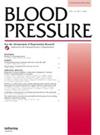主动脉僵硬度和主动脉臂僵硬度失配作为高血压肾功能障碍的标志物
IF 2.3
4区 医学
Q2 PERIPHERAL VASCULAR DISEASE
引用次数: 2
摘要
摘要目的高血压和慢性肾脏疾病的惨淡组合会加重心血管疾病和肾功能丧失。研究指出了动脉和左心室硬化在这一过程中的重要性,但很少有研究比较高血压患者中枢和外周血流动力学与肾功能的关系。材料和方法我们对107名肾功能从正常到严重功能障碍的高血压患者进行了脉搏波分析,以获得中心血压(BP)、增强指数、颈动脉-股动脉和颈动脉-桡动脉脉搏波速度(cfPWV,crPWV)、主动脉-肱动脉硬度失配(cfPWV/crPWV,前臂血流介导的血管舒张的内皮功能和心内膜下活力比率的心肌微血管功能,以及左心室结构指数(左心室质量指数和相对壁厚,RWT)和舒张功能指数(左心房容积指数,E/A和E/é)。结果平均年龄58岁 年,BP 149/87 毫米汞柱,9%患有心血管疾病,31%正在接受降压治疗。平均估计肾小球滤过率(eGFR)为74(范围130-21)ml/min×1.73 而cfPWV和cfPWV/crPWV与eGFR独立相关(r = −0.20,p = 0.002,r = −0.16,p = 0.01)、中心舒张压(r = 0.21,p = 0.04),RWT(r = −0.34,p = 0.001),E/é(r = −0.39,p < 0.001)和E/A(r = 0.27,p = 0.01)在双变量相关性中与eGFR相关,但这些发现在多变量分析中没有保留。高血压性心脏病的剩余标志物和微血管功能指标与eGFR无关。结论高血压患者主动脉硬度增加和主动脉臂硬度错配与eGFR降低独立相关,提示主动脉硬度在高血压介导的肾功能障碍的演变中起着重要作用。主动脉硬度和主动脉臂硬度不匹配可能是发现肾功能下降风险的高血压患者的有用早期标志物。本文章由计算机程序翻译,如有差异,请以英文原文为准。
Aortic stiffness and aortic-brachial stiffness mismatch as markers of renal dysfunction in hypertension
Abstract Purpose The dismal combination of hypertension and chronic kidney disease potentiates both cardiovascular disease and loss of renal function. Research points to the importance of arterial and left ventricular stiffening in this process but few studies have compared aspects of central and peripheral hemodynamics in relation to renal function in hypertension. Materials and methods We investigated 107 hypertensive individuals with renal function ranging from normal to severe dysfunction with pulse wave analysis to obtain central blood pressures (BP), augmentation index, carotid-femoral and carotid-radial pulse wave velocity (cfPWV, crPWV), aortic-to-brachial stiffness mismatch (cfPWV/crPWV), endothelial function by forearm flow-mediated vasodilation and myocardial microvascular function by subendocardial viability ratio, and indices of left ventricular structure (left ventricular mass index and relative wall thickness, RWT) and diastolic function (left atrial volume index, E/A, and E/é). Results Mean age was 58 years, BP 149/87 mm Hg, 9% had cardiovascular disease, and 31% were on antihypertensive treatment. Mean estimated glomerular filtration rate (eGFR) was 74 (range 130–21) ml/min × 1.73 m2. Whereas cfPWV and cfPWV/crPWV were independently related to eGFR (r = −0.20, p = 0.002, r = −0.16, p = 0.01), central diastolic BP (r = 0.21, p = 0.04), RWT (r = −0.34, p = 0.001), E/é (r = −0.39, p < 0.001) and E/A (r = 0.27, p = 0.01) were related to eGFR in bivariate correlations, but these findings were not retained in multivariate analyses. Remaining markers of hypertensive heart disease and measures of microvascular function were not related to eGFR. Conclusion Increased aortic stiffness and aortic-to-brachial stiffness mismatch are independently related to reduced eGFR in hypertensive patients, suggesting an important role for aortic stiffness in the evolution of hypertension-mediated renal dysfunction. Aortic stiffness and aortic-brachial stiffness mismatch may be useful early markers to find hypertensive patients at risk for decline in renal function.
求助全文
通过发布文献求助,成功后即可免费获取论文全文。
去求助
来源期刊

Blood Pressure
医学-外周血管病
CiteScore
3.00
自引率
5.60%
发文量
41
审稿时长
6-12 weeks
期刊介绍:
For outstanding coverage of the latest advances in hypertension research, turn to Blood Pressure, a primary source for authoritative and timely information on all aspects of hypertension research and management.
Features include:
• Physiology and pathophysiology of blood pressure regulation
• Primary and secondary hypertension
• Cerebrovascular and cardiovascular complications of hypertension
• Detection, treatment and follow-up of hypertension
• Non pharmacological and pharmacological management
• Large outcome trials in hypertension.
 求助内容:
求助内容: 应助结果提醒方式:
应助结果提醒方式:


